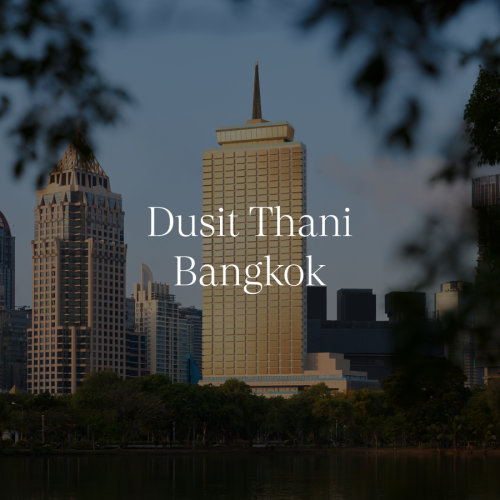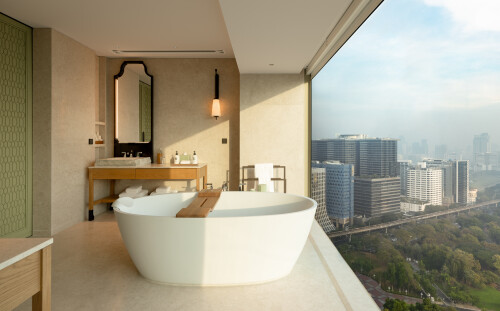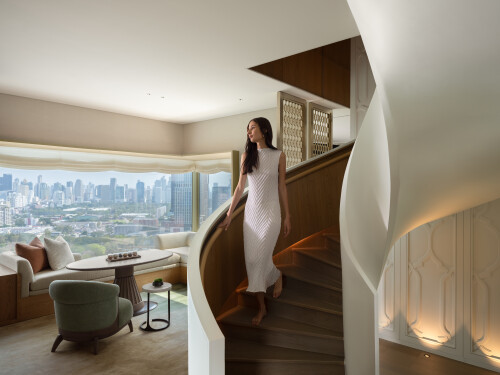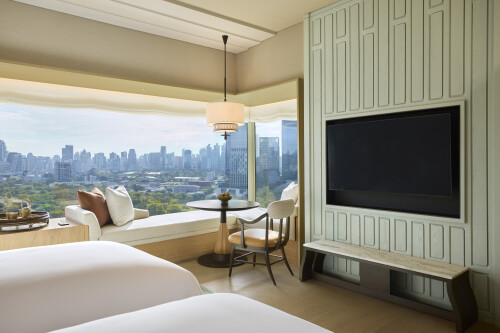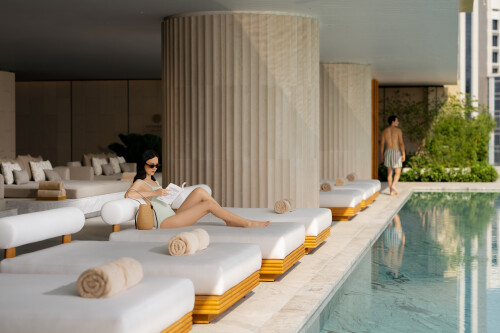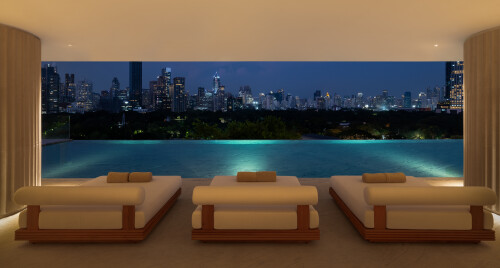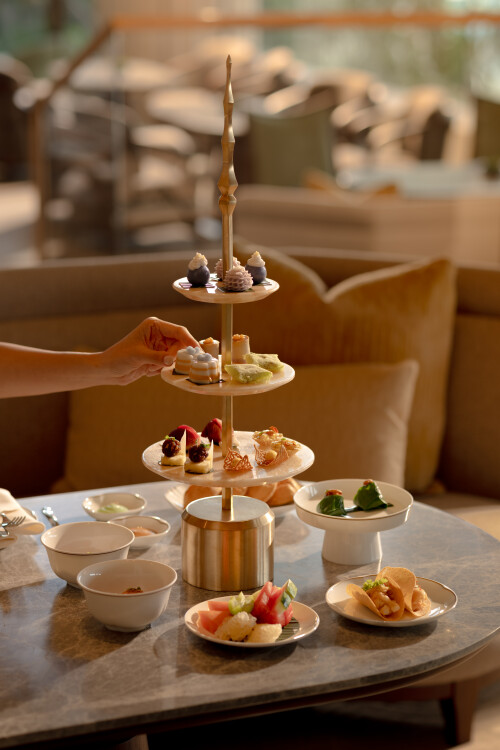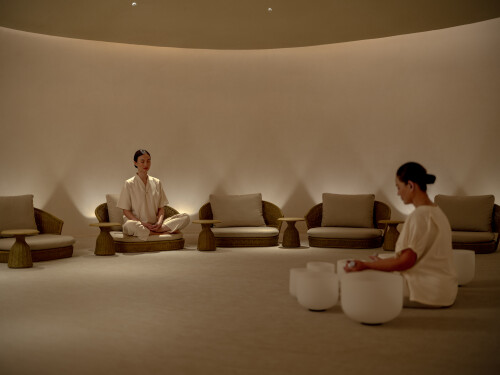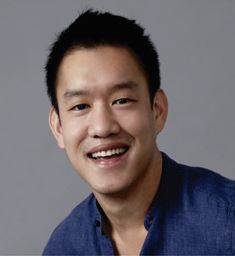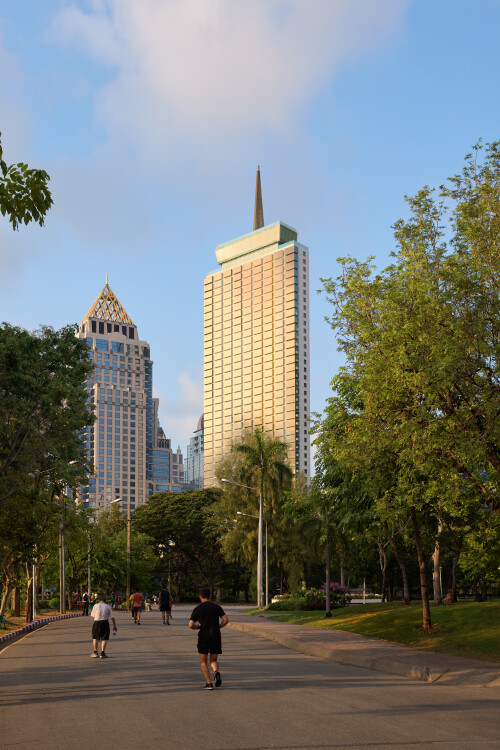HM-HETZELMEDIA
Date : 5.04.2025
German Version see below – Deutsche Version siehe unten
“Next chapter of luxury hospitality in Thailand and in Europe”
Interview with Siradej Donavanik, Vice President Development (Global), Dusit International
“We will bring Dusit’s unique brand of Thai-inspired gracious hospitality to Europe” /
“Our distinctive service DNA is based on four key pillars – Personalized Service, Locality, Well-being, and Sustainability.”
Dusit aims to expand in Germany, Austria, France, Spain, The UK and in Greece
1.4 billion U.S. dollars investment for the new Dusit Thani Hotel Bangkok – the new landmark of Bangkok
HM-HETZELMEDIA-EDITOR Helmut Hetzel talked to Siradej “Champ” Donavanik in Bangkok and Hua Hin, Thailand
By HELMUT HETZEL, Bangkok, Hua Hin
Q: Helmut Hetzel: After five years of (re)construction, Dusit Thani Bangkok has just reopened. What makes the new Dusit in Bangkok special for guests?
A: Siradej Donavanik:
Before we talk about the new Dusit Thani Bangkok, let me take a moment to reflect on the original hotel. Understanding the legacy we are carrying forward is important.
The original Dusit Thani Bangkok was completed in the late 1960s and officially opened in 1970. It was Thailand’s first true five-star hotel under a Thai brand and, at the time, the tallest building in the country. More than just a hotel, it was a landmark. It was a symbol of modern Thai hospitality bringing international five-star standards to Bangkok for the first time.
Situated at the prominent intersection of Silom and Rama IV Road, opposite Lumpini Park, the original Dusit Thani Bangkok became an icon over the decades. The decision to demolish it was not an easy one, especially for my father, as it was originally built by my grandmother and had become a flagship for Thai hospitality.
However, in designing the new hotel, we wanted to preserve its legacy while reimagining the future of Thai hospitality. We conducted extensive research, working closely with both local and international designers, to create a space that honours the past while embracing the future. This wasn’t about replicating the old Dusit Thani, but rather about incorporating elements of its heritage into a contemporary setting that represents the next chapter of luxury hospitality in Thailand.
The new Dusit Thani Bangkok – the new landmark of Bangkok
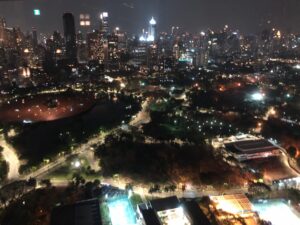
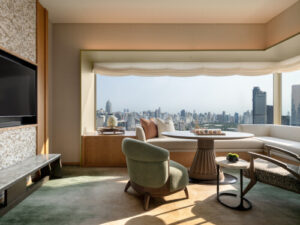
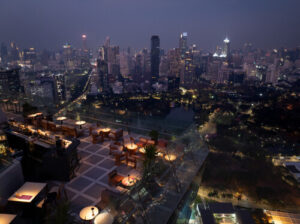
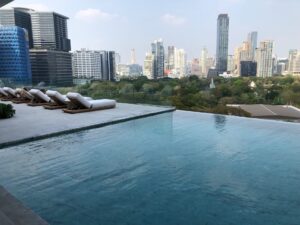
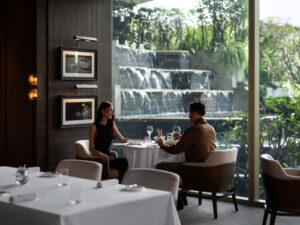
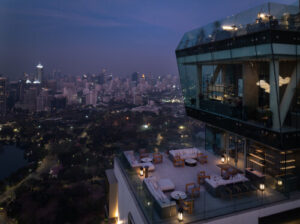
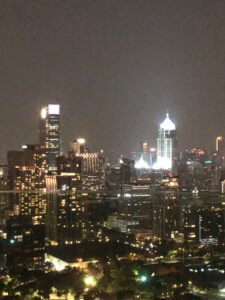
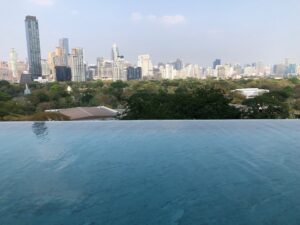
The entire process—from planning to completion—took about seven years. But I believe we have successfully achieved our vision. The new Dusit Thani Bangkok is not just a continuation of the legacy, but also a benchmark for luxury hospitality, competing with the world’s top luxury hotel brands.
Q: How much did Dusit invest in this new project?
A: The new Dusit Thani Bangkok is more than just a hotel. It is a landmark within a larger ecosystem. In addition to the hotel, we have developed branded residences with nearly 400 luxury units, as well as a high-end retail space and modern office space in collaboration with our partner.
Q: With which partners do you work on this project? And how much did Dusit invest?
A: We partnered with Central Pattana Public Company Limited, one of Thailand’s leading retail property management and development companies, which is creating a world-class retail experience to complement the hotel.
Additionally, the project includes premium office spaces, making it a fully integrated development. The total investment for the entire project was approximately 1.4 billion U.S. dollars.
This is why we truly believe that Dusit Thani Bangkok will become a new landmark for the city. The four key components of the development, including the hotel, branded residences, retail, and office space, are designed to complement and support one another.
For example, hotel guests will benefit from access to the retail experience as well as a large rooftop park located above the retail center. Scheduled to open in August this year, the park has been thoughtfully designed in collaboration with landscape specialists to create a lush, green environment featuring plant species chosen for their natural symbiosis.

Siradej Donavanik, Vice President Development (Global), Dusit International
Q: That means I have to come back in August. What is the Dusit Philosophy Khun Champ?
A: We operate across eight distinct brands, ranging from luxury to midscale properties, spanning city hotels, resorts, and long-stay accommodations.
What ties all these brands together is our unique service DNA, which we call the Graciousness Pillars. Thai hospitality is deeply connected to a sense of graciousness, and this principle is at the heart of everything we do.
Our four pillars of graciousness define our approach to hospitality:
Personalized Service – We genuinely care for and understand each guest, recognizing their individual needs. This personalized approach is a key aspect of our hospitality.
Sustainability – Since our company’s founding, we have aimed to make a meaningful, positive impact on the community. Over 30 years ago, our founder established Thailand’s first hospitality school to develop future talent for the industry. More recently, we launched a sustainability initiative called Tree of Life, further reinforcing our commitment to responsible hospitality.
Well-being – Since the COVID-19 pandemic, we have placed a strong emphasis on holistic wellness. At Dusit, wellness goes beyond physical health—it includes mental and emotional well-being as well. We offer organic farms, fresh produce, and mindfulness programs such as yoga, meditation, and sound healing. We believe wellness should be a deeply meaningful experience, not just a service.
Locality – As a Thai hotel group, we are not as large as global brands from the West. However, this allows us to be more bespoke in our approach. Rather than applying a one-size-fits-all model, we embrace local culture, cuisine, and traditions, ensuring that every Dusit property reflects the unique character of its location.
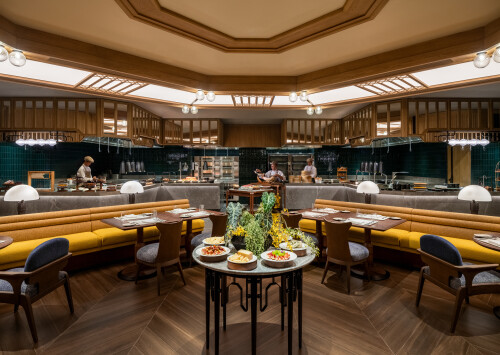
Excellent food and wines in Dusit Thani Bangkok and in all Dusit Hotels

Expansion Strategy in Europe and Beyond
Entering Key European Markets
Q: The Dusit Group now operates 57 hotels in 18 countries. What are your plans for the future?
I remember: Last time we spoke, you mentioned that you had been in Japan. You also have properties in Europe. Dusit recently opened suites in Athens. Dusit has set up offices in Berlin and Paris.
What are your expansion plans, particularly in Europe? Can you tell me more about the Dusit-strategy?
A: Yes, Europe is still a relatively new market for us, even though we already have a presence in Greece, and have established offices in Berlin and Paris.
We see Europe as a huge and highly important market. Expanding there not only allows us to diversify, but also strengthens our brand awareness, which benefits our properties in Asia. As you know, many European travellers love visiting Asia, and having a recognizable brand in Europe can help drive inbound tourism to our hotels in the region.
Q: That means Europe is the region where the Dusit Groupe wants to expand its operations – bringing Thai and Dusit hospitality to Europe. Is that right?
A: In terms of development, we have a twofold approach:
– Expanding in markets where we have already been successful, such as Asia-Pacific, the Middle East, and Africa. For example, we have recently expanded into Kenya in East Africa.
– Entering new key European markets, particularly the DACH region (Germany, Austria, and Switzerland).
Q: Dusit wants to expand into DACH region and France?
A: That’s right. This is why we have set up development offices in Berlin and Paris. These locations allow us to explore potential opportunities in other European countries too, such as Spain and Greece, and possibly the UK.
Currently, our portfolio of nearly 60 hotels is evenly split between resort destinations and city business destinations. This means we have experience operating in both leisure and corporate markets, whether it’s a business hotel in Munich or Vienna or a resort in Ibiza.
Switzerland: An attractive but challenging Market
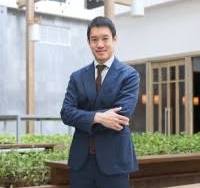
Siradej Donavanik, Vice President Development (Global), Dusit International
Q: What about Switzerland?
A: We would love to enter the Swiss market, but it is very expensive to establish a presence there.
Q: Yes, but Switzerland is known for wealth and investment. It’s a key financial hub. Dusit should be there.
A: Absolutely. Swiss hospitality is renowned worldwide, and the market is highly competitive. However, it is also very costly to enter.
Q: Yes, but I believe that Thai hospitality can be profitable in Switzerland in the highly competitive environment. Do you agree?
A: Of course. If the right opportunity arises, we would definitely consider it.
Q: So your main focus in Europe is Germany, Austria, Switzerland, France, Italy, Greece and Spain?
A: That’s correct.
Q: Do you have any projects in the UK?
A: Yes, we are looking at a few projects in London.
Q: That sounds ambitious, too…
A: It is, but I believe that having ambitious goals is essential. It allows us to be creative and motivate our internal teams to drive for growth.
Our strategy is not just about growth in size—it’s also about growing the right way. Quality is very important.
This is Dusit’s legacy and future vision.
Dusit has been in the industry for 76 years, and this year marks our 76th anniversary. This milestone would not have been possible without our unwavering commitment to quality in everything we do.
Q: Congratulations …
A: Throughout our journey, we have built a strong reputation by focusing on four key pillars:
Personalized service
Well-being
Sustainability
Locality
These pillars define our „graciousness“ philosophy, shaping the way we approach hospitality. As we expand into new markets, we remain committed to maintaining this unique identity.
Looking ahead, the future of hospitality will require innovation and adaptability, but our focus will always be on delivering authentic, high-quality experiences that resonate with our guests.
Regenerative Wellness and the Future of Tourism and Overtourism
Q: Is overtourism the new challenge of the tourism industry? Some cities, like Amsterdam, Venice, and Barcelona, are trying to limit tourism. What is your opinion on this trend?
A: Yes, this is a growing trend, and unfortunately, it can have negative impacts. We have seen the impact of overtourism in places like Venice and Barcelona, where high visitor numbers have led to environmental and social strain.
Q: Amsterdam is also trying to reduce the number of tourists.
A: Yes, and it’s not just Amsterdam, it’s happening in Thailand, Japan, and Bali as well.
Overtourism has tarnished the image of the hospitality industry in some destinations. However, I strongly believe that tourism can and should be a force for good.
Quality Tourism vs. Mass Tourism
Q: Do you think the future lies in quality tourism rather than mass tourism?
A: Absolutely. Given the challenges we’ve seen, I firmly believe that regenerative travel and regenerative hospitality are the way forward.
Regenerative tourism goes beyond just sustaining a destination. It’s about actively improving it. The question is no longer just about preserving what we have, but rather, how can we enhance it in a more sustainable and responsible way?
It’s about creating meaningful experiences for travellers while ensuring that tourism benefits local communities and the environment.

The Impact of Climate Change on Hospitality
Q: The whole climate change debate has a significant impact on the hospitality industry. How do you see this influence?
A: Yes, I agree.
Q: For example, the Green Party in Germany wants to restrict flights. I personally think, this is an extreme idea. Instead of banning flights, we should focus on developing more environmentally friendly airplanes.
A: Yes, I see your point.
Q: That should be the real challenge: making aviation more sustainable, rather than preventing people from traveling.
A: I completely agree. I don’t think the answer is simply to stop flying; people will always need to travel.
Tourism continues to grow, and it is a major global employer. The industry creates millions of jobs, not only directly in hotels but also indirectly, supporting restaurants, retail, travel agencies, and other sectors.
It’s important to recognize this economic and social value.
Sustainability and Carbon Offsetting
Q: How should the Tourism-industry tackle this issue?
A: I don’t think it’s a black-and-white situation. Instead of restricting travel, we should focus on carbon offsetting and sustainable practices.
Many hotels are already adopting sustainability initiatives. At Dusit, we acknowledge that we may not be the most advanced in this area, but we are actively taking steps in the right direction.
For example, we are committed to sustainable sourcing. We prioritize organic ingredients such as rice, eggs, and vegetables, and we source locally whenever possible. Small but meaningful steps like this, when taken industry-wide, can make a big difference.
The key is for every company to measure their impact, implement effective sustainability programs, and continuously improve their practices.
This is just the beginning. We need to keep pushing forward.
Q: Thank you very much for this interesting conversation.
About Siradej „Champ“ Donavanik (39)

Vice President Development (Global), Dusit International
Siradej „Champ“ Donavanik, a third-generation to Dusit International, continues the legacy of his grandmother, Thanpuying Chanut Piyaoui, and his father, Chanin Donavanik. As Vice President of Development (Global), he is responsible for driving growth strategies, leading sustainability initiatives, and overseeing the company’s transformation across all business sectors.
Champ’s leadership spans real estate, food, and education projects, with a strong focus on sustainable growth and innovation. Under his guidance, Dusit has expanded its luxury hotel and real estate portfolio while fostering a culture of environmental responsibility.
He is also a key member of the Dusit Sustainability Committee and serves as Chief Culture Officer for ASAI Hotels, where he promotes creativity and diversity.
A graduate of the University of Exeter and the Sasin School of Management, Champ’s vision is to ensure that Dusit’s operations positively impact its community, contributing to a better future for the next generation.
Links:
www.dusit.com
https://www.dusit.com/dusitthani-bangkok/main/?gad_source=1&gclid=Cj0KCQjwna6_BhCbARIsALId2Z1eM9ZUZHSCFmpMntEYugSPxrBCGH3RejabqVluRx4n3RHick7IaLUaAoFaEALw_wcB
www.hetzelmedia.com
www.helmuthetzel.com
www.haagsche-salon.com
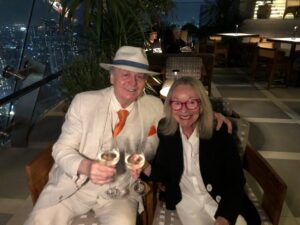
SPIRE – The Sky Bar of the new Dusit Thani in Bangkok – fantastic

Dusit Thani – simply the best
/ End/ Copyright © by HELMUT HETZEL / The Hague/
Deutsche Version
HM-HETZELMEDIA
Datum: 05.04.2025
„Nächstes Kapitel der Luxushotellerie in Thailand und Europa wird geschrieben“ – 1,4 Mrd. US-Dollar in neues Dusit Thani Hotel in Bangkok investiert
Interview mit Siradej Donavanik, Vice President Development (Global), Dusit International
„Wir bringen Dusit´s einzigartige, thailändische Gastfreundschaft nach Europa“
„Unsere unverwechselbare Service-DNA basiert auf vier Säulen – Persönlicher Service, Lokalität, Wohlbefinden und Nachhaltigkeit“
Dusit plant Expansion nach Deutschland, Österreich, Frankreich, Spanien, Großbritannien und Griechenland – möglicherweise auch in der Schweiz
HM-HETZEL-MEDIA-Editor Helmut Hetzel sprach mit Siradej „Champ“ Donavanik in Bangkok und Hua Hin, Thailand
Von HELMUT HETZEL, Bangkok, Hua Hin
Frage: Helmut Hetzel:
Nach fünf Jahren des Neubaus wurde das Dusit Thani Hotel Bangkok nun wiedereröffnet. Was macht das neue Dusit in Bangkok für Gäste so besonders?
Antwort: Siradej Donavanik:
Bevor wir über das neue Dusit Thani Bangkok sprechen, möchte ich einen Moment innehalten, um über das ursprüngliche Hotel zu reflektieren. Es ist wichtig, das Erbe zu verstehen, das wir weitertragen.
Das ursprüngliche Dusit Thani Bangkok wurde Ende der 1960er Jahre fertiggestellt und 1970 offiziell eröffnet. Es war das erste echte Fünf-Sterne-Hotel Thailands unter einer thailändischen Marke und damals das höchste Gebäude des Landes. Es war mehr als nur ein Hotel – es war ein Wahrzeichen. Ein Symbol moderner thailändischer Gastfreundschaft, das internationale Fünf-Sterne-Standards erstmals nach Bangkok brachte.
Das ursprüngliche Hotel lag an der markanten Kreuzung von Silom und Rama IV Road, gegenüber dem Lumpini-Park, und wurde über Jahrzehnte hinweg zu einer Ikone. Die Entscheidung, es abzureißen, fiel nicht leicht – vor allem nicht meinem Vater, da es ursprünglich von meiner Großmutter erbaut wurde und ein Flaggschiff der thailändischen Gastfreundschaft darstellte.
Beim Entwurf des neuen Hotels wollten wir das Erbe bewahren und gleichzeitig die Zukunft der thailändischen Hotellerie neu denken. Wir führten umfassende Recherchen durch und arbeiteten eng mit lokalen und internationalen Designern zusammen, um einen Ort zu schaffen, der die Vergangenheit ehrt und gleichzeitig die Zukunft umarmt. Es ging nicht darum, das alte Dusit Thani zu kopieren, sondern Elemente seines Erbes in eine zeitgemäße Umgebung zu integrieren – als nächstes Kapitel der Luxushotellerie in Thailand.




Der gesamte Prozess – von der Planung bis zur Fertigstellung – dauerte rund sieben Jahre. Aber ich glaube, wir haben unsere Vision erfolgreich umgesetzt. Das neue Dusit Thani Bangkok ist nicht nur eine Fortsetzung des Erbes, sondern auch ein neuer Maßstab in der Luxushotellerie, der mit den besten Marken der Welt konkurriert.
Frage: Wie viel hat Dusit in dieses neue Projekt investiert?
Antwort: Das neue Dusit Thani Bangkok ist mehr als nur ein Hotel – es ist ein Wahrzeichen innerhalb eines größeren Ökosystems. Neben dem Hotel haben wir markenbezogene Residenzen mit fast 400 luxuriösen Einheiten sowie einen hochwertigen Einzelhandelsbereich und moderne Büroflächen in Zusammenarbeit mit unserem Partner entwickelt.
Frage: Mit welchen Partnern arbeiten Sie bei diesem Projekt zusammen? Und wie hoch war die Investition?
Antwort: Wir haben mit der Central Pattana Public Company Limited zusammengearbeitet, einem der führenden Unternehmen Thailands im Bereich Einzelhandelsimmobilienentwicklung, das mit einer Shopping Mall ein Einkaufserlebnis von Weltklasse schafft, das das Hotel ergänzt.
Zusätzlich umfasst das Projekt hochwertige Büroflächen – ein vollständig integriertes Entwicklungsprojekt. Die Gesamtinvestition belief sich auf rund 1,4 Milliarden US-Dollar.
Wir sind überzeugt, dass das Dusit Thani Bangkok ein neues Wahrzeichen der Stadt wird. Die vier Schlüsselelemente – Hotel, Residenzen, Einzelhandel und Büros – sind so konzipiert, dass sie sich gegenseitig ergänzen und unterstützen.
Beispielsweise profitieren Hotelgäste vom Zugang zu den Einzelhandelsflächen sowie zu einem großen Dachgarten über dem Einkaufszentrum. Dieser soll im August dieses Jahres eröffnet werden und wurde in Zusammenarbeit mit Landschaftsarchitekten geplant. Er bietet eine üppige, grüne Umgebung mit Pflanzenarten, die in natürlicher Symbiose miteinander stehen.

Siradej Donavanik, Vice President Development (Global), Dusit International
Frage: Das heißt, ich muss im August zurückkommen. Was ist die Dusit-Philosophie, Khun Champ?
Antwort: Wir betreiben acht verschiedene Marken – von Luxus- bis Mittelklassehotels, darunter Stadthotels, Resorts und Langzeitunterkünfte.
Was alle Marken verbindet, ist unsere einzigartige Service-DNA – die „Graciousness“-Säulen. Thailändische Gastfreundschaft ist tief mit einem Sinn für Anmut und Herzlichkeit verbunden, und dieses Prinzip steht im Mittelpunkt unseres Handelns.
Unsere vier Säulen der „Graciousness“ definieren unseren Ansatz:
Persönlicher Service – Wir kümmern uns wirklich und ehrlich um unsere Gäste und gehen auf ihre individuellen Bedürfnisse ein. Dieser persönliche Ansatz ist ein zentraler Bestandteil unserer Gastfreundschaft.
Nachhaltigkeit – Seit der Gründung unseres Unternehmens wollen wir einen positiven Beitrag zur Gesellschaft leisten. Vor über 30 Jahren gründeten wir die erste Hotelfachschule Thailands. Kürzlich haben wir mit „Tree of Life“ eine Nachhaltigkeitsinitiative ins Leben gerufen, die unser Engagement unterstreicht.
Wohlbefinden – Seit der COVID-19-Pandemie legen wir großen Wert auf ganzheitliches Wohlbefinden. Dazu gehören organische Landwirtschaft, frische Zutaten und Programme wie Yoga, Meditation und die Klangtherapie.
Lokalität – Als thailändische Hotelgruppe sind wir kleiner als viele westliche Marken, aber genau das erlaubt uns einen maßgeschneiderten Ansatz. Wir integrieren lokale Kultur, Küche und Traditionen in jedes Hotel, das den Charakter seines Standorts widerspiegelt.
Exzellente Küche und hervorragende Weine im Dusit Thani Bangkok und in allen Dusit Hotels

Die Expansionsstrategie in Europa und anderswo
Frage: Die Dusit Group betreibt derzeit 57 Hotels in 18 Ländern. Was sind Ihre Zukunftspläne? Ich erinnere mich: Beim letzten Gespräch erwähnten Sie Japan. Jetzt gibt es auch Dusit Suiten in Athen, sowie Büros in Berlin und Paris. Was ist die Strategie für Europa?
Antwort: Europa ist für uns ein relativ neuer Markt – obwohl wir bereits in Griechenland vertreten sind und Büros in Berlin und Paris eröffnet haben.
Europa ist für uns enorm wichtig. Die Expansion dorthin hilft uns nicht nur bei der Diversifizierung, sondern stärkt auch die Markenbekanntheit – was wiederum unseren Hotels in Asien zugutekommt. Viele europäische Gäste reisen gern nach Asien – eine starke Marke in Europa unterstützt den Tourismus nach Asien.
Frage: Europa ist also eine zentrale Region für Dusit. Sie wollen thailändische Gastfreundschaft nach Europa bringen?

Siradej „Champ“ Donavanik, Vice President Development (Global), Dusit International
Antwort: Unsere Entwicklungsstrategie ist zweigleisig:
Expansion in bereits erfolgreichen Märkten wie dem asiatisch-pazifischen Raum, dem Nahen Osten und Afrika. Kürzlich haben wir beispielsweise ein Hotel in Kenia eröffnet.
Eintritt in neue europäische Märkte, insbesondere in der DACH-Region (Deutschland, Österreich, Schweiz).
Frage: Dusit plant also auch die Expansion in die DACH-Region und nach Frankreich und weitere Länder in Europa?
Antwort: Ja, genau deshalb haben wir unsere Entwicklungsbüros in Berlin und Paris gegründet. Von dort aus analysieren wir auch andere Märkte wie Spanien, Griechenland und potenziell Großbritannien.
Unsere fast 60 Hotels verteilen sich derzeit gleichmäßig auf Urlaubs- und Geschäftsreiseziele. Das gibt uns Erfahrung in beiden Segmenten – sei es ein Business-Hotel in München oder Wien oder ein Resort auf Ibiza.
Die Schweiz
Frage: Was ist mit der Schweiz. Ist das auch ein attraktiver Markt für Dusit?
Antwort: Wir würden sehr gerne in die Schweiz expandieren, aber es ist dort sehr teuer.
Frage: Aber die Schweiz ist reich, ein Finanzzentrum. Dusit sollte dort vertreten sein.
Antwort: Absolut. Die Schweizer Hotellerie genießt Weltruf – der Markt ist hart umkämpft, aber auch attraktiv. Wenn sich die richtige Gelegenheit ergibt, werden wir sie nutzen.
Frage: Also liegt Ihr Fokus in Europa auf Deutschland, Österreich, Schweiz, Frankreich, Italien, Griechenland und Spanien?
Antwort: Das ist korrekt.
Frage: Gibt es Projekte in Großbritannien?
Antwort: Ja, wir prüfen derzeit einige Projekte in London.
Frage: Das klingt ebenfalls ehrgeizig…
Antwort: Das ist es. Aber ambitionierte Ziele treiben uns an. Sie fördern Kreativität und Motivation in unseren Teams.
Unser Wachstum zielt nicht nur auf Größe ab – sondern auf Qualität. Das ist das Vermächtnis von Dusit.
Dusit ist seit 76 Jahren in der Branche. Dieses Jahr feiern wir unser 76-jähriges Bestehen – das ist möglich dank unseres Engagements für Qualität.
Frage: Glückwunsch!
Antwort: Danke. Unser Ruf basiert auf den vier Säulen:
Persönlicher Service
Wohlbefinden
Nachhaltigkeit
Lokalität
Diese Philosophie der „Graciousness,“ wie gesagt, prägt unseren Ansatz. Auch in neuen Märkten bleiben wir dieser Identität treu.
Die Zukunft der Hotellerie verlangt Innovation und Anpassung. Unser Ziel bleibt: authentische, hochwertige Erlebnisse für unsere Gäste.
Regeneratives Reisen und die Zukunft des Tourismus
Frage: Ist Overtourism und Massentourismus die neue Herausforderung der Tourismusbranche? Städte wie Amsterdam, Venedig oder Barcelona versuchen, den Tourismus zu begrenzen. Was denken Sie darüber?
Antwort: Ja, das ist ein wachsendes Problem. Wir haben die negativen Auswirkungen in Städten wie Venedig und Barcelona gesehen – Umwelt- und Sozialbelastungen.
Frage: Auch Amsterdam will weniger Touristen.
Antwort: Ja, und nicht nur dort. Auch Thailand, Japan und Bali sind betroffen. Overtourism hat dem Image der Branche geschadet. Aber Tourismus kann und sollte eine Kraft des Guten sein.
Qualitätstourismus statt Massentourismus
Frage: Ist der Weg der Zukunft der Qualitätstourismus?
Antwort: Absolut. Regeneratives Reisen ist der Schlüssel.
Es geht nicht nur ums Erhalten, sondern ums aktive Verbessern. Wie können wir Orte aufwerten – verantwortungsvoll, nachhaltig?
Tourismus soll der lokalen Gemeinschaft und der Umwelt zugutekommen und zugleich bereichernde Erfahrungen schaffen.
Klimawandel und Hotellerie
Frage: Der Klimawandel betrifft auch die Hotellerie stark. Wie sehen Sie das?
Antwort: Ich stimme zu.
Frage: Die Grünen in Deutschland wollen Flüge einschränken. Ich finde das extrem. Besser wäre es, umweltfreundlichere Flugzeuge zu entwickeln.
Antwort: Ja, das sehe ich auch so.
Frage: Das sollte das Ziel sein – nachhaltiger Luftverkehr statt Reiseverbote.
Antwort: Ganz Ihrer Meinung. Menschen werden immer reisen.
Tourismus wächst weiter – er ist ein bedeutender Wirtschaftsfaktor, schafft Millionen Jobs – direkt und indirekt.
Diese soziale und wirtschaftliche Bedeutung darf man nicht vergessen.
Nachhaltigkeit und CO₂-Kompensation
Frage: Wie sollte die Tourismusbranche damit umgehen?
Antwort: Es gibt keine einfache Antwort. Anstatt Reisen einzuschränken, sollten wir auf Kompensation und nachhaltige Praktiken setzen.
Viele Hotels gehen hier mit gutem Beispiel voran. Auch wir bei Dusit arbeiten an Verbesserungen.
Beispiel: Nachhaltige Beschaffung und Einkäufe. Wir achten auf Bio-Zutaten – Reis, Eier, Gemüse – und kaufen lokal ein. Das sind kleine, aber bedeutende Schritte.
Der Schlüssel liegt im Messen, Umsetzen und kontinuierlichen Verbessern nachhaltiger Strategien.
Das ist erst der Anfang. Wir müssen so weiter weitermachen.
Frage: Vielen Dank für das interessante Gespräch.
Zur Person:
Über Siradej „Champ“ Donavanik (39)
Vice President Development (Global), Dusit International
Siradej „Champ“ Donavanik, dritte Generation der Dusit International Familie, führt das Erbe seiner Großmutter Thanpuying Chanut Piyaoui und seines Vaters Chanin Donavanik fort. Als Vice President Development (Global) treibt er globale Wachstumsstrategien, Nachhaltigkeitsinitiativen und Transformationen in allen Geschäftsbereichen voran.
Er verantwortet Projekte in den Bereichen Immobilien, Gastronomie und Bildung – mit Fokus auf nachhaltiges Wachstum und Innovation.
Er ist Mitglied im Dusit Sustainability Committee und Chief Culture Officer von ASAI Hotels, wo er Kreativität und Vielfalt fördert.
Er studierte an der University of Exeter sowie an der Sasin School of Management. Sein Ziel: Dusit soll die Gesellschaft positiv beeinflussen – für eine bessere Zukunft der nächsten Generationen.
Links:
https://www.dusit.com/
https://www.dusit.com/dusitthani-huahin/
www.hetzelmedia.com
www.helmuthetzel.com
www.haagsche-salon.com

Sky Bar SPIRE im neuen Dusit Thani Hotel, Bangkok, Thailand, Februar 2025

Dusit Thani – Simply the best
/ Textende / Copyright © by HELMUT HETZEL / Den Haag


